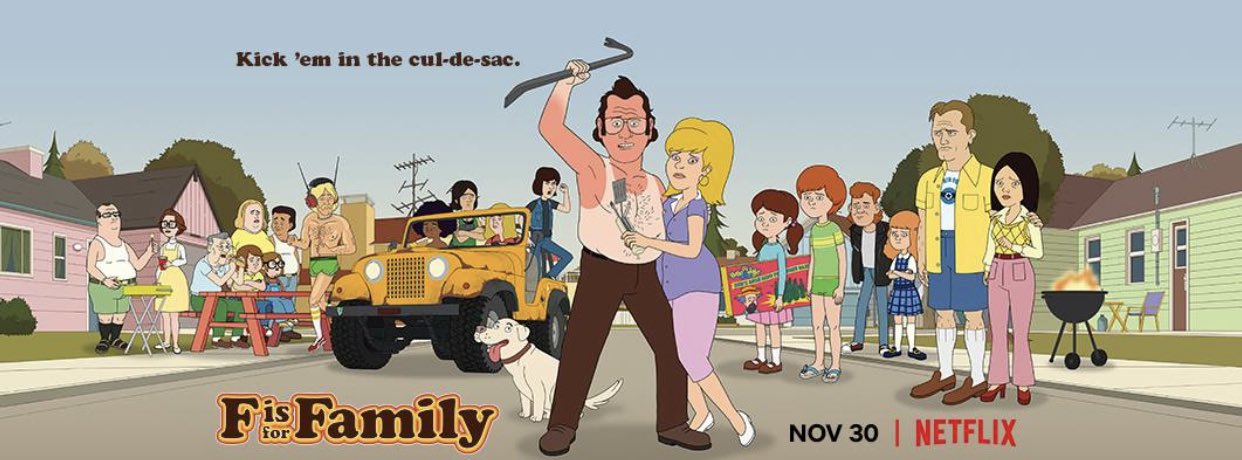Season Review: F is for Family Season Three
F is for finally — our favorite 1970’s Netflix family has returned!
Spoilers for Season 3 below!
F is for Family is like if King of the Hill were set in the 1970s with East Coasters — with all the brutal honesty of the era to boot. While it even looks stylistically similar to the show, its humor is one of a kind with a dialogue that sets it apart from other series — making it obvious that it would return for a third season.
The last season left off on a pretty precarious plot point, with Sue implied to be pregnant after Frank used a condom from his old snack-stocking job (where Smokey’s favorite downtime activity was poking holes into said condoms for fun.) Fans were unsure about where this would lead initially since a major conflict throughout the narrative has been Murphy’s struggle with financial stability. However, there was no topical approach to subjects like abortion or even a buildup to Frank discovering Sue’s pregnancy — instead, the new season kicks off with the family having a casual bonding experience in the living room, watching old family movies on a rickety projector with Sue already heavily pregnant. The season takes place over the entirety of the summer — a small time-jump that dodges fans’ expectations of the pregnancy even being the main conflict. Rather than being the sole driving force to the season’s narrative, the pregnancy looms threateningly in the background, being the stimulus for many of the plot points within the show without ever really being a plot point in itself.
With the start of the new season comes a few notable changes in the cast, due to the events of previous episodes. Sue is dealing with the emotional turmoil of pregnancy while struggling with her own merit as a person. She wrestles with her self-worth, realizing she “never finishes anything” and questions if the only thing she can do is “make babies.” She spends her time attempting to come up with a new invention after her stolen Salad Tosser idea became a hit on the market. Meanwhile, Bill has discovered girls, Kevin is still struggling to make it as a musician, and Maureen can’t seem to find respect as a girl in the field of sciences.
All this and Frank appears to want to bring the family closer together with the baby on the way — despite Sue’s concerns that they won’t be able to accomplish the dreams they had before their children came into their lives. Frank’s dream to become a pilot and Sue’s dream to finish college seem to be ripped from their hands after the discussion of their children being old enough to be self-sufficient, leaving the audience to wonder how the future baby will impact their marriage.
In place of the expected main conflict being the pregnancy, the season introduces a new character: a former Air Force pilot named Chet Stevenson. While Frank and Chet hit it off because of their shared service and love of flying, Sue spies Chet’s misogyny toward his Vietnamese wife, Nguyen Nguyen, and has to convince Frank that Chet is not what he seems. Chet winds up being the antagonist of the season, causing many problems for Frank and the family — among issues that were already prevalent.
Much of the character development that took place on the kids’ part happened in the backdrop of Frank and Sue’s conflicts — which wound up being the point of the season. All three kids face inner turmoil of some kind which causes them to lash out in one way or another — Kevin quits his band and gets into a bad crowd of friends while at summer school, Bill’s steady decline into debauchery is heightened when he starts dating the psychotic Bridget Fitzsimmons, and Maureen’s need for attention skyrockets when she realizes that she isn’t going to be the baby of the family anymore. A war zone of character development is happening behind Frank and Sue, who are too occupied with what’s in front of them to pay attention.
F is for Family does a great job of representing true family issues — you won’t find any Full House conflicts in this show. Even in its dated form, there are plenty of facets of the show that dive into what being part of an average American family is really like behind closed doors. The series creates a plane of equality for everyone watching it — showing all sides of what being both a kid and a parent means in this dynamic. Its honesty truly shines as one of its best qualities, and each season seems to tackle one main thing that all children and parents could be more honest with each other about. While every season showcases the imperfections of the regular parent, Season 3’s execution of this was its strongest yet — leaving the way for Season 4 to get the parents fully involved in their kids’ lives.
A bit of backstory was shed on Frank and Sue’s respective families this season, where it was revealed Sue’s parents never really approved of Frank, while Frank performed a decently heart-wrenching monologue about his father’s emotional abuse towards him growing up. These parental characters seemed to leave as quickly as they were introduced (aside from the cliffhanger where we learn that Frank’s father is going to be staying with the family for an indefinite amount of time.) There was a surprising lack of flashback elements used this season, considering how many opportunities there were for them. Extra talk of Frank’s service in the army in addition to dialogue about his and Sue’s families leave a teensy bit to be desired when it comes to how much will be revealed about their pasts and when-adding to a list of reasons the season felt a bit slow.
Aside from new characters, there wasn’t all that much that separated Season 3 from other seasons — usually, with every season an animated show has, there’s a steady uptake in quality, and even with the new conflicts, it feels as though Season 3 was simply a ladder for the (hopefully) upcoming Season 4, where Frank and Sue will (hopefully) pay full attention to what’s happening/has happened in their children’s lives, the audience will get to know Frank’s father, and quite possibly see the bombshell birth of the new Murphy child. There’s only so much “stretch” a show can have before the audience starts to get bored — and hopefully, there’ll be some kind of “snap” from that stretch in the next season.
Episodes never have simple A & B plots — there’s usually multiple ongoing plots within episodes, choosing to give a lens into what every family member (or neighbor) is up to rather than just focus on one. There’s a lot of credit to be given here when it comes to juggling this well, but there were certain things about the season that left a lot of focus to be desired — the main example being Rosie’s campaign, which was something that had a ton of set up, but ultimately wasn’t given much attention. Since Rosie is such a likable character, it felt dissatisfying to simply have his political efforts shoved to the backdrop up until the very end. At certain times, it feels as though the show is trying to juggle too many plot balls and can’t give each one the focus it deserves — also, was there a minor plot hole where Kevin should have been in summer school while the family was at the lake house? Maybe it was shortened? Who knows.
Plot elements aside, all voice acting performances were outstanding as usual — boy are we worried about Bill Burr’s voice (and Laura Dem’s, for that matter!) There’s a lot of screaming in this show, but the downright honesty of it all makes it well worth the watch. Certain character voices that are meant to be annoying such as Ginny’s and Phillip’s tend to do the job a little too well, but they get props. The voice acting goes hand in hand incredibly with the humor, which still lands well with its running gags (something something “put you through a f**king wall,” etc. Also, any time Bill is mentally scarred by something is a laugh-out-loud moment.)
Unfortunately, there’s also the animation, which still remains to be kind of garbage. It undermines how wonderful the voice acting and humor is sometimes, with odd, awkward pauses taking place between dialogue and even lines that don’t properly sync up with the characters’ mouths. There’s even this really subtle tick where sometimes a character will lightly jitter — it’s not extremely potent, but it’s happened more than once. The most interesting the animation gets is during Kevin’s daydreams/drug scenes — which there sadly aren’t many of. The show would do itself justice to experiment with itself (which would also help in creating distinguishing qualities between seasons, which there aren’t too many of.)
All in all, F is for Family has a good setup for its next season — despite a few minor gripes here and there, the narrative remains to be honest, funny, and satirical. C is for Consistency — and hopefully, we’ll ‘C’ the Murphy’s again for a Season 4!
























"There are also other characters that come and go (also owned by the Warner Bros. Discovery conglomerate media company)."
Huh. Is that just referring to other characters from the show itself, or is this implying that the new season is going to have cameos from other WBD IPs